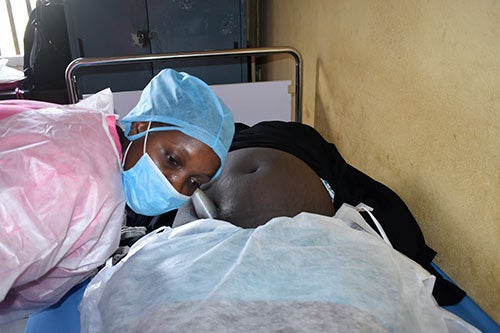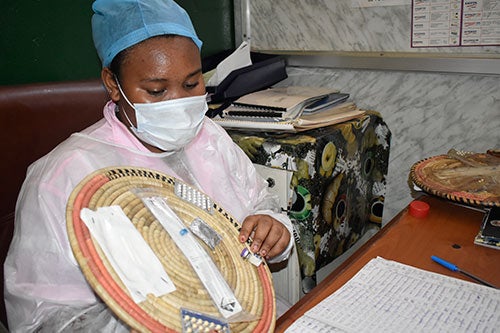News
Amid pandemic and unrest, midwives undeterred in saving lives in Conakry
- 11 February 2021
News
CONAKRY, Guinea – “Our midwives who work during this period of political crisis are brave and courageous because they face both COVID-19 and violence in the streets,” said Dr. Sekou Keita, the director of Communal Medical Center (CMC) of Matam, a commune of Conakry.
It has indeed been a harrowing year for the midwives of Guinea.
First, the COVID-19 pandemic arrived in March 2020, straining a health system still recovering from the 2014-2016 Ebola epidemic. Some 14,000 cases of COVID-19 have since been confirmed in the country, according to the World Health Organization. Months later, following the country’s 18 October presidential election, upheaval erupted in the streets.
“I am in Taouyah, in Gnariwada,” said Aïssatou Nènè Baldé, a CMC midwife, shortly after the election. “This is one of the areas of increased political tension. But I go out to work because women need me.”

Ms. Baldé was recruited as part of a 9-month project supported by UNFPA and Takeda aiming to ensure quality sexual and reproductive services, including maternal and newborn health care, during the pandemic.
Vandalism was rife in Gnariwada and deadly clashes were regularly reported in the final weeks of 2020. Venturing outside one’s home during a demonstration required courage, but even this could not hold Ms. Baldé back. “Our clients’ needs come first,” she said with determination.
Guinea’s recent experience with Ebola in many ways prepared the country for the current pandemic. The country’s disease surveillance system, for instance, has been greatly strengthened.
Still, the health system is seriously underresourced, and there are fears that the current pandemic could strip resources away from other urgent medical needs – including maternal health.
Guinea has one of the highest maternal mortality ratios in the world, according to 2017 United Nations data; some 576 women die in pregnancy or childbirth per every 100,000 live births.
The UNFPA-Takeda midwifery project aims to lower these tragic numbers. The recruited midwives are trained to safely provide the full suite of maternal health services. They have been provided with personal protective equipment (PPE)and comprehensive training on infection prevention and control. The health facilities where they work have been outfitted to provide a secure environment against COVID-19 for both providers and clients.

“Their mission is to offer quality maternal health care in 10 health facilities, under conditions of maximum security, while respecting hygiene protocols in the time of COVID-19,” said Dr. Keita.
During the nine months in which the project is active, some 14,200 births are expected to take place in the 10 supported health facilities.
“We have to assist each of these women,” Dr. Keita added. Her medical centre is one of the most frequented health facilities in Conakry. On average, it registers 367 births per month.
Much of the unrest has quieted in recent weeks, but simmering discontent continues, along with occasional demonstrations. Today, the midwives recall the tremendous courage they were able to summon as they faced crisis upon crisis.
“It is a lot: the political crisis, COVID-19 and leaving our families to go to the health centre to save lives,” said Loua Joséphine, a midwife at the CMC of Flamboyant, in the neighbourhood of Ratoma, another area that experienced numerous clashes.
But “if the post-election crisis is to stop us, then women risk losing their lives. This is why we are prepared to put our own security at risk. We know how to navigate our commute to work to stay safe,” she added.
Ms. Baldé recalled one morning where she had to strategize to safely make it to her shift. “I left my house at 6 a.m. I had to take several paths to get to the CMC to avoid being attacked by the demonstrators in this neighbourhood,” she described. Sometimes she would pay for transport to avoid hazards on the way to work. “The lives of the women and babies in my care are more important than the expense of transportation.”
As she spoke, she gently administered care to a newborn baby. "She's a girl. She's perfectly healthy, and ready to go on her mum's chest," Ms. Baldé said, smiling.